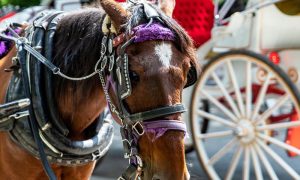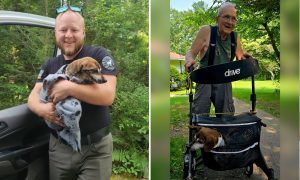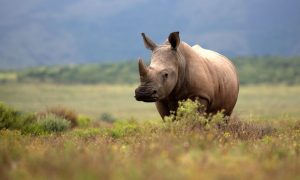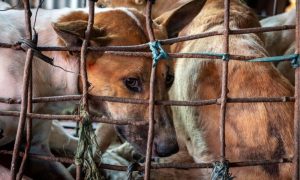For most of his life, Charlie’s Quest — now just known as Charlie — was forced to run around racetracks at top speed, despite suffering multiple bone fractures.
Fortunately, rescuers from PETA played the perfect matchmaker in finding Charlie a home with recent widow Alyson Mahoney.
Before the rescue, Charlie experienced agonizing pain for the majority of his seven-year life. PETA happened upon him during an expose on the racing industry’s practice of medicating injured horses to keep them racing (and keep them bringing in cash).
“In the investigative video, an assistant trainer (Scott Blasi, assistant to Hall of Fame trainer Steve Asmussen) can be heard calling Charlie a “rat”—the racing industry’s term for horses who don’t win,” PETA Senior Vice President Kathy Guillermo told Lady Freethinker. “Charlie couldn’t win, because the bones and tendons of his legs were too damaged from injuries that hadn’t been allowed to heal properly.”
PETA followed Charlie from tracks in New York to West Virginia to Pennsylvania. At each event, Charlie almost always received last place.
While Charlie was in desperate need of proper care, Alysun Mahoney, too, needed some light in her life as she coped with the loss of her husband, Greg. She reflects on a marriage marked by the love for animals and almost 20 rescues together.
“Charlie was the first animal I’ve adopted on my own. So this means a lot to me. I like to think that I’m adopting him in memory of my own late husband, Greg,” Mahoney shared.
Today, Charlie roams freely in grassy knolls with his new family, which includes Alyson’s other rescued horses, Henry and Caroline.
Had rescuers not stepped in, Charlie was bound to snap a limb while competing, and then be cruelly euthanized.
“Horses who are barely physically mature are turned into arthritic, crippled animals by the overuse of medication in order to hide their injuries,” said Guillermo. “Most Thoroughbreds used in racing are burned out and cast off before their eighth birthdays—even though they can live to be 30 or more.”
Guillermo urges the public to support legislation to protect horses and to raise awareness of abuse and drugging by the racing industry. Anyone can help stop the suffering by avoiding the racetrack and refusing to fund animal cruelty.






